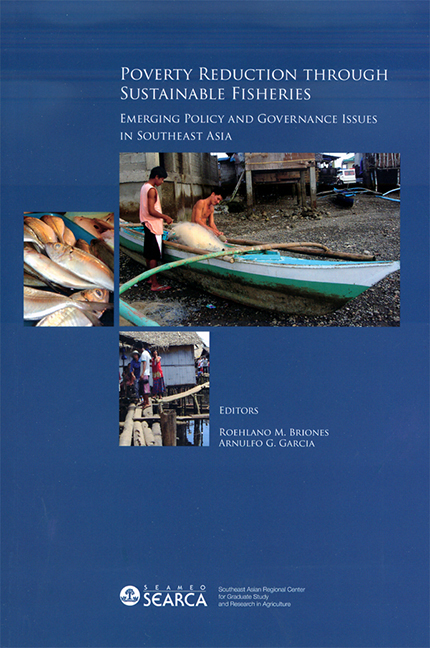 Poverty Reduction through Sustainable Fisheries
Poverty Reduction through Sustainable Fisheries Book contents
- Frontmatter
- Contents
- Figures
- Tables
- Foreword
- Acknowledgments
- 1 Introduction and Synthesis
- 2 Fish and the Poor
- 3 Fish and the Poor: The Case of Cambodia
- 4 Changing Demand and Supply Structure of Fish in Asia: Past Trends and Future Projections
- 5 Regional Economic Integration of the Fisheries Sector in ASEAN Countries
- 6 Technology Policies for Capture Fisheries and Aquaculture in Southeast Asia
- 7 The Status, Current Trends and Future Directions for Production and Technology of Fisheries in Southeast Asia
- 8 The Seafood Supply Chain and Poverty Reduction
- 9 Strategy for the Empowerment of Aquaculture Fish Farmers in Indonesia
- 10 Status of Coastal and Marine Resources: Implications for Fisheries Management and Poverty in Southeast Asia
- 11 Property Rights and Institutional Arrangements in Southeast Asian Fisheries
- 12 Regional Cooperation in Aquatic Resource Management for Southeast Asia
1 - Introduction and Synthesis
Published online by Cambridge University Press: 21 October 2015
- Frontmatter
- Contents
- Figures
- Tables
- Foreword
- Acknowledgments
- 1 Introduction and Synthesis
- 2 Fish and the Poor
- 3 Fish and the Poor: The Case of Cambodia
- 4 Changing Demand and Supply Structure of Fish in Asia: Past Trends and Future Projections
- 5 Regional Economic Integration of the Fisheries Sector in ASEAN Countries
- 6 Technology Policies for Capture Fisheries and Aquaculture in Southeast Asia
- 7 The Status, Current Trends and Future Directions for Production and Technology of Fisheries in Southeast Asia
- 8 The Seafood Supply Chain and Poverty Reduction
- 9 Strategy for the Empowerment of Aquaculture Fish Farmers in Indonesia
- 10 Status of Coastal and Marine Resources: Implications for Fisheries Management and Poverty in Southeast Asia
- 11 Property Rights and Institutional Arrangements in Southeast Asian Fisheries
- 12 Regional Cooperation in Aquatic Resource Management for Southeast Asia
Summary
OVERVIEW
Fisheries, which cover both aquaculture and capture of wild stocks, are an important source of food and livelihood for the poor in Southeast Asia. In this region, fish consumption provides a large share of animal protein to the average person's diet, from 40 per cent in the Philippines and Thailand to 57 per cent in Indonesia and Cambodia. Low-value fish, in particular, is a staple in the diets of the poor. Fisheries comprise a fast-growing subset of agriculture. Production growth in the region has averaged 4.4 per cent annually from 1980-2004, almost twice the 2.7 per cent production growth of other agricultural products over the same period. Moreover, the share of fish in all agricultural exports in the region reached 19 per cent in 2004, which is triple of 1980's share of only 6 per cent. In addition, the value of fish exports in 2004 ($9.5 billion) exceeded that of fruits and vegetables ($4.1 billion), cereals ($3.9 billion), coffee, tea, and cocoa ($2.7 billion), and poultry ($0.7 billion; all data from FAO, 2006).
Despite its importance, the fisheries sector remains a neglected area in agricultural research and development, long dominated by crop agriculture. Fortunately, in recent years, this neglect is being corrected, as the economic contribution and dynamism of fisheries have become more prominent. However, expectations of sustained growth for fisheries-dependent resources. The links among fisheries, poverty, and sustainability raise a host of important and open questions for policy research.
To address these concerns, a regional conference was held under the auspices of the Southeast Asian Regional Center for Graduate Study and Research in Agriculture (SEARCA), the WorldFish Center, and the Philippine Council for Aquatic and Marine Research and Development (PCAMRD). The conference brought together leading regional and international fisheries policy experts and practitioners. The conference reviewed existing knowledge and identified priority research areas and policy directions for increasing and sustaining benefits from fish production for the rural poor. Findings and recommendations would contribute towards region-wide research and capacity-building program on fisheries and rural development by SEARCA and its partners.
- Type
- Chapter
- Information
- Poverty Reduction through Sustainable FisheriesEmerging Policy and Governance Issues in Southeast Asia, pp. 1 - 14Publisher: ISEAS–Yusof Ishak InstitutePrint publication year: 2008
